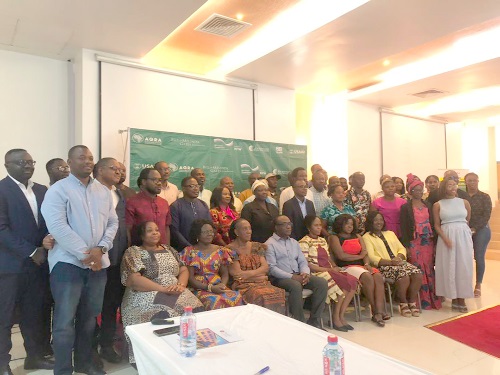
KfW-AGRA project on rice, cassava ends — €3.5m invested in phase 1
KfW, a German Development Cooperation, through its phase one project supervised by AGRA, has invested €3.5 million in the last four years to address the challenges in the rice and cassava value chains in the country.
Under the phase one project implemented between 2018-2022, it was established to mobilise investment for the development of infrastructure, facilitate structured market and value chain financing for rice and cassava that would improve competitiveness, productivity and profitability along the value chains.
A Programme’s Officer at AGRA, Bashiru Musah Dokurugu, disclosed this at an event in Accra last Thursday to wrap up the KfW phase one project.
He said the project, which was under a partnership,tasked AGRA to provide technical support to the Ministry of Food and Agriculture (MoFA) and the Ministry of Trade and Industry (MoTI) to develop appropriate Public-Private Partnership (PPP) model to facilitate and mobilise the public and private investment into rice and cassava production infrastructure and value chain.
“The consortium supported the production and marketing system around lead processors to create commercial opportunities for rice and cassava farmers that resulted in increased access to markets, long-term business relationships with processors, improved access to services and products including financing, high-quality inputs, productivity enhancing technologies and mechanisation services,” he added.
The event, which brought together key stakeholders and partners, was to share insights and learnings from the implementation of Phase one of the KfW-AGRA project and provided the opportunity for stakeholders and partners to share outcome stories, best practices and feedback to improve future interventions.
Success of PFJ
A Deputy Minister of Agriculture, Yaw Frimpong Addo, mentioned that the KfW-AGRA project had been one of the key transformational projects in the rice and cassava value chains.
The project, he said, coincided with government’s flagship programme “Planting for Food and Jobs (PFJ) which had in focus, agricultural development as the indispensable engine for growth and development for the entire nation.
That, he said, was a reason why the government harnessed resources from all ends to give the agricultural sector the needed support to boost production along the value chain to meet the country’s food and nutrition security needs as well as create wealth and increase income for farmers.
“Therefore, the success of PFJ cannot be mentioned without the support of these two projects and their contribution to agricultural development in Ghana,” the minister added.
For her part, the Country Manager for AGRA, Juliette Lampoh-Agroh, described the project as a successful one which has reached more 200,000 small holder farmers in the country.
“All targets and indicators have either been achieved or over achieved across the value chain and the entire system the project has worked on right from production to processing and the value chain.
Indeed, it was part of this project that we supported the promotion of local rice in Ghana and we managed to align very closely with government’s interventions where we supported the PFJ intervention which also helped us to expand our interventions from eight regions at the beginning to 12 regions in the country and we are looking to expand to 16 regions,” she said.